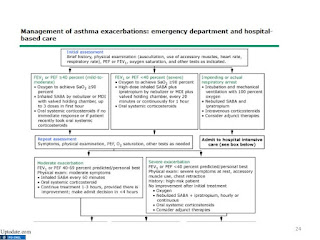Asthma and Vitamin D: What's the Connection?
Warning For Asthma Patients Regarding Inhalers
Warning for asthma patients regarding inhalers - CBS ChicagoWatch CBS News
Doctors warn asthma patients about a major change coming to inhalers. Starting January 1, the inhaler Flovent made by GSK will no longer be on pharmacy shelves. Physicians say an authorized generic version takes its place.
Be the first to know
Get browser notifications for breaking news, live events, and exclusive reporting.
Not Now Turn OnUnderstanding The Terms 'Acute' And 'Chronic' When It Comes To Asthma
Asthma is considered a chronic condition. However, its symptoms may be considered acute when they temporarily become more severe, like during an asthma attack.
Asthma is a respiratory condition marked by inflammation and narrowing of the airways. This can result in a range of recurring symptoms, including:
Asthma is a chronic condition, meaning it's a long-term condition that requires ongoing management. However, asthma exacerbation — also known as an asthma attack — can be acute. These periods of severe symptoms tend to come on suddenly and require quick treatment.
Here's a closer look at acute asthma exacerbation, some common triggers for it, and tips for managing asthma.
Acute asthma exacerbation is a sudden and severe worsening of your asthma symptoms.
During acute asthma exacerbation, the airways in your lungs become inflamed and narrow, making breathing difficult. Other asthma symptoms — like wheezing, coughing, and shortness of breath — can also worsen.
You may also notice that your usual medications, like your inhaler, provide less relief during these moments.
Read more about acute asthma exacerbation.
Acute asthma exacerbation usually has a specific trigger, such as:
Asthma triggers can vary a lot from person to person. If you aren't sure what yours are, consider keeping a symptom journal to track whether certain foods, activities, or environments tend to coincide with acute exacerbation of your symptoms.
Asthma is typically a lifelong condition, but your symptoms can go through cycles of improving and worsening. In some cases, the overall severity of your symptoms might decrease, though your airways will likely remain sensitive to certain triggers.
Keeping up with the treatment plan that your healthcare professional prescribed, even during periods of minimal symptoms, can help prevent acute exacerbation.
Like many other chronic conditions, asthma requires ongoing management. Depending on your symptoms and their severity, this will likely involve a combination of medical treatment, lifestyle changes, and monitoring.
Medical treatmentThe medical treatment of asthma may include:
Asthma is a chronic condition that requires long-term management. However, you may experience acute asthma exacerbation, meaning a sudden worsening of symptoms.
For most people with asthma, the condition will never go away completely, but the symptoms can improve over time.
Warning Over Asthma Inhalers
Excessive use of reliever inhalers for asthma is linked to a significantly increased risk of dying from the disease, a new study revealed today.
Researchers found that over-use of short acting reliever drugs known as beta agonists is associated with a higher risk of death from asthma.
But regular use of inhaled steroids, known as longer acting preventer drugs, was linked with a decreased risk of asthma death.
They discovered that people prescribed more than one reliever inhaler a month cut their risk of death by 60% if they also regularly used a preventer inhaler.
The study was based on more than 96,000 patients in the UK diagnosed with asthma who were entered onto the General Practice Research Database between 1994 and 1998.
Of these, 43 had died from asthma, with 35 of the deaths in people aged 50 and above.
The research team from Connecticut, USA, calculated the relative risk of dying from asthma for people using the preventer and reliever drugs, taking into account factors such as the patients' age, sex, weight, smoking habits and frequency of GP visits.
They found that between seven and 12 prescriptions of reliever inhalers in the previous year increased the risk 16-fold and 13 or more prescriptions increased it by more than 50-fold.
The authors, writing in the journal Thorax today, state that asthma death is a rare outcome for which the rates have been declining.
But they say: "Despite the variety of respiratory medications available, inhaled steroids constituted the only class of respiratory drug in this study which was consistently related to a decreased risk of asthma death."
The British Thoracic Society said that reliever inhalers have their place in the management of asthma.
Dr John Harvey of the BTS said: "This research clearly demonstrates just how important it is for asthma patients to use both reliever and preventer medicines if they are prescribed by their GP.
"Both can have their place in managing mild and severe asthma correctly."
Preventer medication, which is usually in a brown, red or orange inhaler, helps to control swelling and inflammation in the airways for the long term.
Reliever inhalers, which are typically blue, are taken as required to relieve symptoms by relaxing muscles in narrowed airways.
The BTS said overwhelming research showed both forms of medication are safe and effective.
It is advising anyone concerned about using reliever inhalers to talk to their GP or asthma nurse.
{"status":"error","code":"499","payload":"Asset id not found: readcomments comments with assetId=131039, assetTypeId=1"}


Comments
Post a Comment